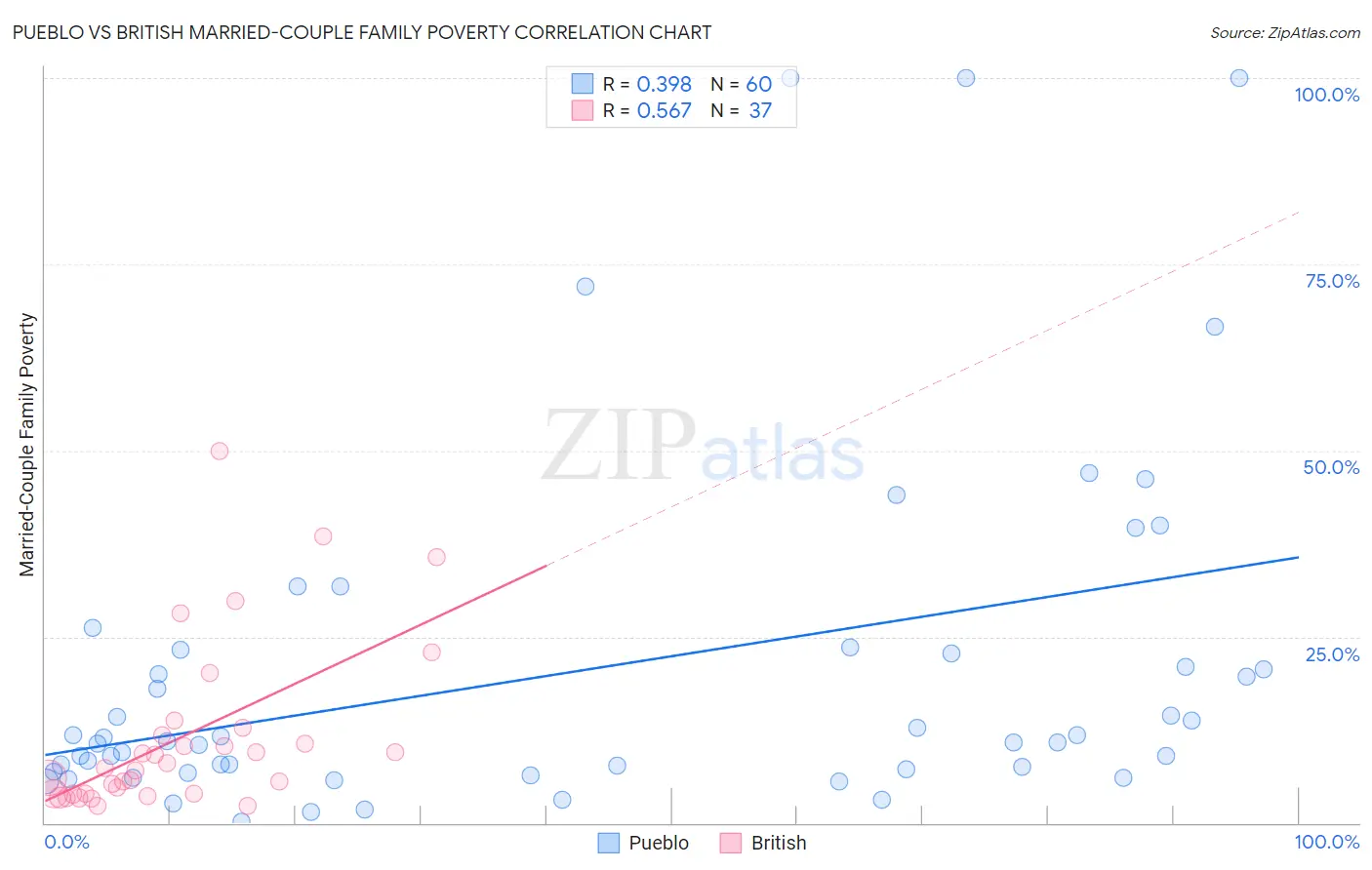Pueblo vs British Married-Couple Family Poverty
COMPARE
Pueblo
British
Married-Couple Family Poverty
Married-Couple Family Poverty Comparison
Pueblo
British
11.1%
MARRIED-COUPLE FAMILY POVERTY
0.0/ 100
METRIC RATING
341st/ 347
METRIC RANK
4.3%
MARRIED-COUPLE FAMILY POVERTY
99.8/ 100
METRIC RATING
46th/ 347
METRIC RANK
Pueblo vs British Married-Couple Family Poverty Correlation Chart
The statistical analysis conducted on geographies consisting of 119,779,377 people shows a mild positive correlation between the proportion of Pueblo and poverty level among married-couple families in the United States with a correlation coefficient (R) of 0.398 and weighted average of 11.1%. Similarly, the statistical analysis conducted on geographies consisting of 521,525,466 people shows a substantial positive correlation between the proportion of British and poverty level among married-couple families in the United States with a correlation coefficient (R) of 0.567 and weighted average of 4.3%, a difference of 158.3%.

Married-Couple Family Poverty Correlation Summary
| Measurement | Pueblo | British |
| Minimum | 0.23% | 2.4% |
| Maximum | 100.0% | 50.0% |
| Range | 99.8% | 47.6% |
| Mean | 20.5% | 11.5% |
| Median | 10.9% | 7.3% |
| Interquartile 25% (IQ1) | 7.0% | 3.9% |
| Interquartile 75% (IQ3) | 23.0% | 12.2% |
| Interquartile Range (IQR) | 16.0% | 8.3% |
| Standard Deviation (Sample) | 23.7% | 11.3% |
| Standard Deviation (Population) | 23.5% | 11.2% |
Similar Demographics by Married-Couple Family Poverty
Demographics Similar to Pueblo by Married-Couple Family Poverty
In terms of married-couple family poverty, the demographic groups most similar to Pueblo are Tohono O'odham (11.2%, a difference of 0.93%), Pima (11.4%, a difference of 2.6%), Navajo (11.9%, a difference of 6.6%), Puerto Rican (12.6%, a difference of 13.7%), and Yuman (9.7%, a difference of 14.2%).
| Demographics | Rating | Rank | Married-Couple Family Poverty |
| Lumbee | 0.0 /100 | #333 | Tragic 8.3% |
| Immigrants | Dominican Republic | 0.0 /100 | #334 | Tragic 8.4% |
| Sioux | 0.0 /100 | #335 | Tragic 8.7% |
| Apache | 0.0 /100 | #336 | Tragic 9.0% |
| Yakama | 0.0 /100 | #337 | Tragic 9.0% |
| Cheyenne | 0.0 /100 | #338 | Tragic 9.4% |
| Crow | 0.0 /100 | #339 | Tragic 9.6% |
| Yuman | 0.0 /100 | #340 | Tragic 9.7% |
| Pueblo | 0.0 /100 | #341 | Tragic 11.1% |
| Tohono O'odham | 0.0 /100 | #342 | Tragic 11.2% |
| Pima | 0.0 /100 | #343 | Tragic 11.4% |
| Navajo | 0.0 /100 | #344 | Tragic 11.9% |
| Puerto Ricans | 0.0 /100 | #345 | Tragic 12.6% |
| Immigrants | Yemen | 0.0 /100 | #346 | Tragic 12.8% |
| Yup'ik | 0.0 /100 | #347 | Tragic 13.4% |
Demographics Similar to British by Married-Couple Family Poverty
In terms of married-couple family poverty, the demographic groups most similar to British are Serbian (4.3%, a difference of 0.030%), Immigrants from Japan (4.3%, a difference of 0.050%), Immigrants from South Central Asia (4.3%, a difference of 0.12%), Australian (4.3%, a difference of 0.19%), and Turkish (4.3%, a difference of 0.27%).
| Demographics | Rating | Rank | Married-Couple Family Poverty |
| Immigrants | Northern Europe | 99.8 /100 | #39 | Exceptional 4.2% |
| French Canadians | 99.8 /100 | #40 | Exceptional 4.2% |
| Northern Europeans | 99.8 /100 | #41 | Exceptional 4.3% |
| Scottish | 99.8 /100 | #42 | Exceptional 4.3% |
| Swiss | 99.8 /100 | #43 | Exceptional 4.3% |
| Immigrants | Japan | 99.8 /100 | #44 | Exceptional 4.3% |
| Serbians | 99.8 /100 | #45 | Exceptional 4.3% |
| British | 99.8 /100 | #46 | Exceptional 4.3% |
| Immigrants | South Central Asia | 99.8 /100 | #47 | Exceptional 4.3% |
| Australians | 99.7 /100 | #48 | Exceptional 4.3% |
| Turks | 99.7 /100 | #49 | Exceptional 4.3% |
| Burmese | 99.7 /100 | #50 | Exceptional 4.3% |
| Immigrants | Lithuania | 99.7 /100 | #51 | Exceptional 4.3% |
| Russians | 99.7 /100 | #52 | Exceptional 4.3% |
| Welsh | 99.7 /100 | #53 | Exceptional 4.3% |